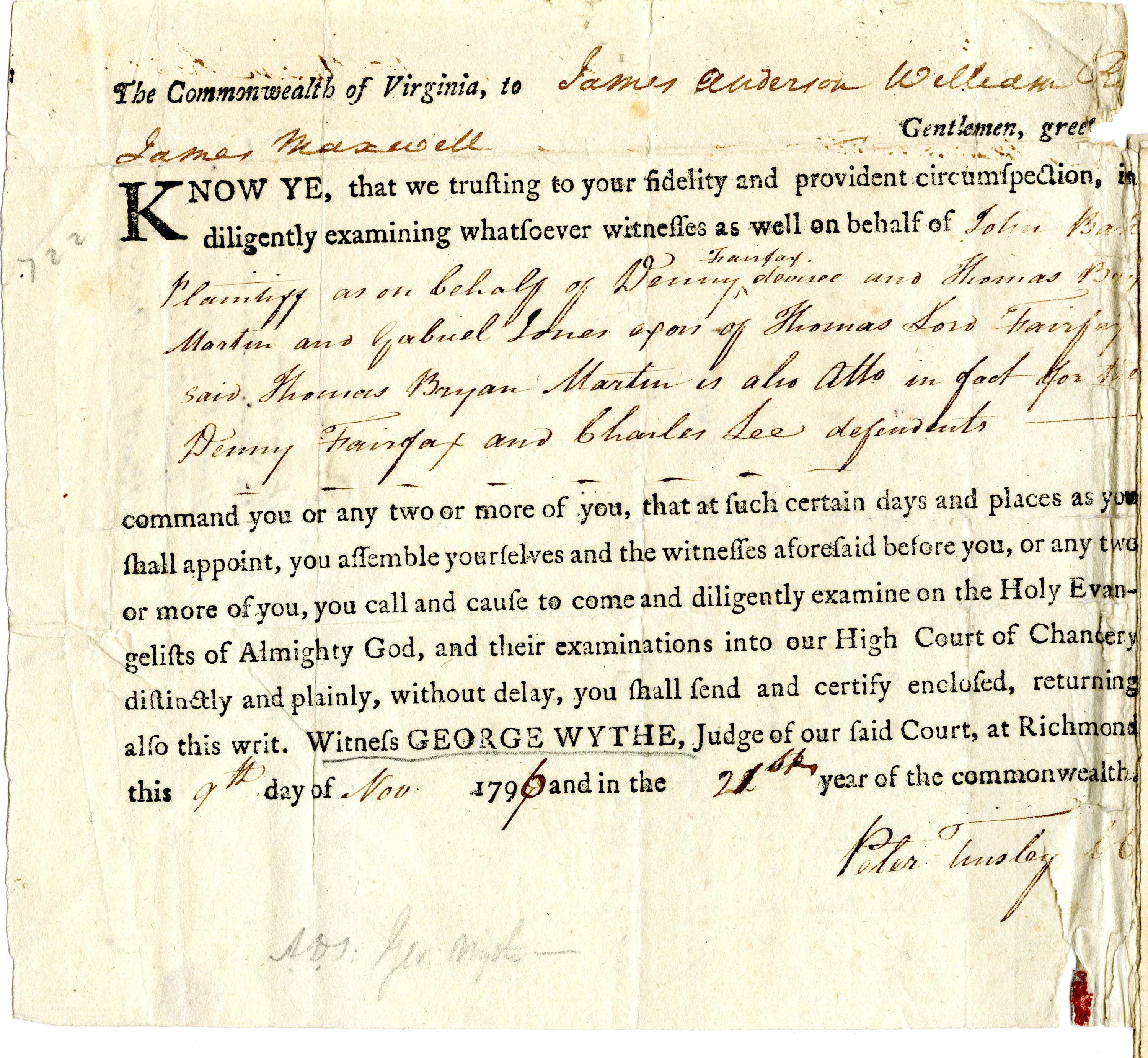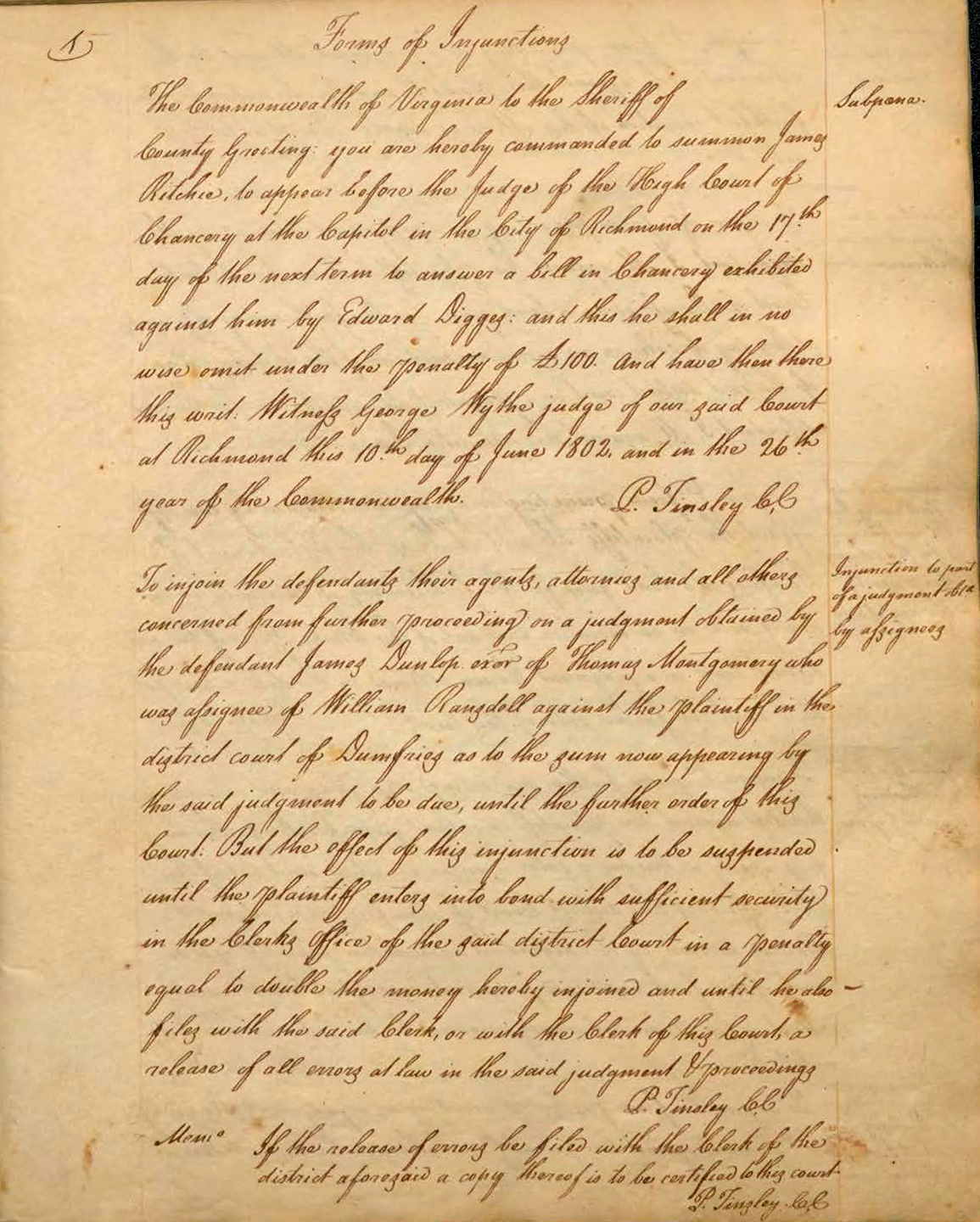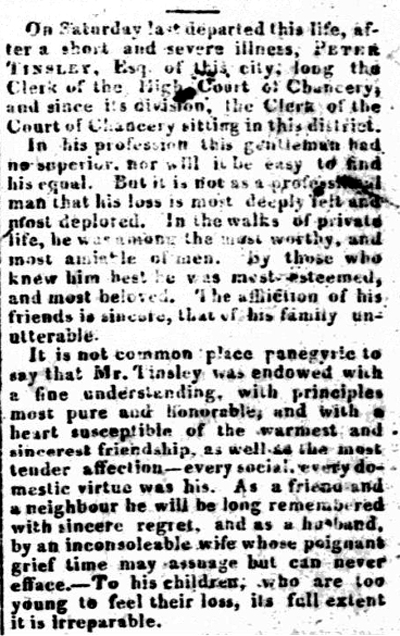Peter Tinsley

Peter Tinsley (1750s – July 21, 1810) was a Virginia attorney, and Clerk of the Court for the High Court of Chancery in Richmond during and after George Wythe's tenure as chancery court judge. At some time in the early 19th century, Tinsley compiled a legal form book in manuscript, for his work as the court clerk.
Contents
Life
Although the date of his birth is unknown, Peter was the son of Thomas and Agnes Tinsley, who were married in 1754. Peter had at least four siblings, the most famous of whom was Colonel Thomas Tinsley (1755–1822).
Tinsley lived in Richmond, just a few blocks from the homes of George Wythe and John Marshall, and near the Virginia Capital building, where the state courts were located.[1] He married Maria Brown, daughter of John Brown (one of Wythe's former students), on July 12, 1803.[2] They had four children, the second of whom they named George Wythe Tinsley.[3] Tinsley died on July 10, 1810 "after a short and severe illness."[4]
Clerk of the High Court of Chancery
According to his obituary, Tinsley began as Clerk of the High Court of Chancery while Wythe was the sole Chancellor (sometime after 1788). He continued as clerk after the re-division of the court in 1802 until his death in 1810,[5] when he was replaced by W.W. Hening.

As Wythe's clerk for more than a decade, Tinsley had a unique perspective into the Chancellor's life and work. Tinsley's "form book" from this time, survives. In this manuscript, Tinsley compiled various sample documents for the court's use, sparing them from having to reinvent the wheel each time it needed to issue a document. Without the clerk and his book of forms, the court could not readily follow proper procedure nor maintain efficient function.
Virginia's High Court of Chancery also made use of pre-printed forms which the clerk could issue for routine tasks, simply by filling in the appropriate information in blank spaces left for that purpose.
Forgery Trial
Following Wythe's death by possible poisoning, Tinsley was a witness in the trial of George Wythe Sweeney in June of 1806 where he testified that six checks drawn in Wythe's name had not been written or signed by Wythe.[6] Tinsley was also a witness to the last-minute changes to Wythe's will following the poisoning.
Thomas Tinsley
Peter's brother Thomas served as an officer in the Revolutionary War, and for "eight consecutive one-year terms as a Hanover County delegate to Virginia's General Assembly."[7] Thomas was the builder of Totomoi, an historic plantation in Hanover County, north of Richmond.[8] Thomas was likely the eldest surviving male Tinsley sibling, earning him the bulk of any family inheritance. Thomas' path crossed with his brother's work more than once.
It was Thomas Tinsley who recommended a fourteen-year-old Henry Clay for a job in Peter's office, in or around 1793, bringing Clay within reach of Wythe's influence.[9] Although Wythe had apparently set aside teaching and dedicated himself to his work as a jurist, he made an exception for Clay and "took the young man under his wing" when he recognized Clay's potential.[10]
Thomas was a Captain in the army when he was "transferred to the southern frontier," and apparently left without paying "a debt to a freedwoman in Wythe's household," cook and housekeeper, Lydia Broadnax. Wythe intervened, writing to "his friend," President Jefferson, to encourage Captain Tinsley to resolve the matter.[11] Wythe needn't have bothered the President with the matter; Peter Tinsley stepped up in his brother's defense and paid the debt, and asked that Wythe write Jefferson to clear Thomas' reputation.[12]
Obituary, The Enquirer (Richmond, VA), 24 July 1810
Page 3

Tinsley's obituary, from The Enquirer (Richmond, Virginia), July 24, 1810:
Obituary, The Virginia Patriot (Richmond, VA), 24 July 1810
Page 3

Obituary from The Virginia Patriot (Richmond, Virginia), July 24, 1810:
See also
References
External links
- Legal form book of Peter Tinsley, clerk of the High Court of Chancery, George Wythe Papers, Special Collections Research Center, Swem Library, College of William and Mary.
- "Tobias Lear to John Rutherfurd, 18 April 1792," Founders Online, National Archives.
- "Tinsley" family genealogy, F.L. Preston.
- "Trial of George Wythe Sweeney (June 2 and 23, 1806)", Encyclopedia Virginia.</ref>